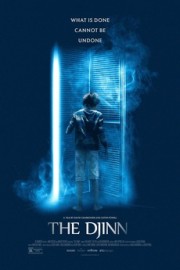The Djinn
“The Djinn” is set in the late 1980s. Clearly, the young protagonist of the film didn’t watch any horror films from that era, because if he had, you have to think he wouldn’t be so silly as to try a spell from a book he found in a new home where someone had died. Would he? It’s no matter, because “The Djinn” is a nifty horror thriller with some great chills, and a twist that, while fairly predictable, still manages to leave us gasping in how well it pulls it off.
Dylan Jacobs (Ezra Dewey) and his father (Rob Brownstein) have recently moved. Dylan is mute, unable to speak, and he has visions of his mother, who has left him and his father alone. His father is a night time DJ, and plays songs for Dylan during his time slots. They have a nice relationship, but the loss of Michelle (Tevy Poe) lingers over everything. One night, Dylan finds a mysterious book in the apartment, where the previous tenant has passed away. It has a ritual to summon The Djinn, a supernatural entity that, if summoned, offers the summoner what their heart most desires. Buckle in for quite a night of terror with Dylan in the apartment.
Writers and directors David Charbonier and Justin Powell so successfully build the tension in the house when Dylan is beset upon by The Djinn that, honestly, we don’t even think of the fact that we are not hearing any dialogue, save for a narrator when Dylan is reading from the book. The suspense is built from visuals and sound effects and music (a particularly solid ’80s-synth score by Matthew James), and there is strong use of both, as well as low-budget visual effects and makeup that haunt us throughout the film’s 82 minutes. The obvious comparison might seem like “A Quiet Place” considering Dylan’s inability to speak, but the film hues much closer to the ’80s “trapped in the house” formula Charbonier and Powell are drawing from, and I like how Dylan is smart and scared, but doesn’t feel helpless. His inability to speak doesn’t make him weak; he is smart and resourceful, and does what he can to survive the night. That’s a big part of why “The Djinn” works, as well as a third act that brings the story full circle, and in a way that gives us both an emotional climax, in addition to the obvious, gratuitous one. That Charbonier and Powell pull it off as successfully as they do is why “The Djinn” leaves us with chills, and feeling good about what we just saw as an experience.










